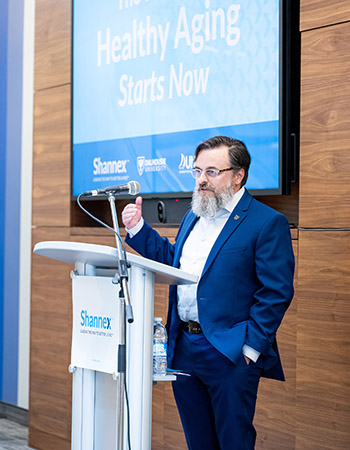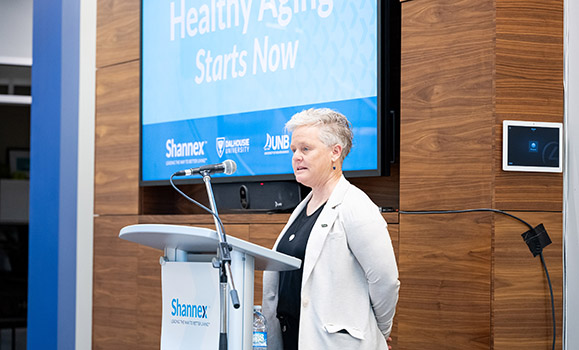What are the factors that contribute to better health outcomes among aging adults? That’s what Dalhousie University aims to discover, thanks to a transformative $2-million gift from Shannex.
The family-owned organization, a leader in long-term care and residential facilities, announced the gift on Tuesday (May 28) part of a $3.5-million investment it is making to support healthy aging research in Atlantic Canada. The announcement is timely; more than 22 per cent of the region’s population is age 65 or older, surpassing that of any other region in the country. That percentage is also expected to grow over the coming years, which creates unique health challenges both for Atlantic Canada and the world.
“People are living longer,” says Jason Shannon, president of Shannex. “The idea that people retire at a specific age is outdated. At Shannex, we embrace the long life, the healthy, engaged, and contributing life. We’re challenging ourselves and our partners to work together to create a longevity-ready society, one that is inclusive and focused on the opportunities of this wonderful new reality.”
Enhancing the safety and well-being of seniors
At Dalhousie, Shannex’s gift will support the creation of the Shannex Research Chair in Artificial Intelligence (AI) and Healthy Aging. Working collaboratively with Dal’s faculties of Health and Computer Science, the research chair will develop predictive models to enhance the safety and well-being of seniors. It will also draw on available data to identify and propose other proactive strategies for enhancing long-term care systems and improving health outcomes.
“We’re delighted to partner with Shannex on this critical research chair position in AI and healthy aging,” says Dr. Kim Brooks, president and vice-chancellor, Dalhousie University. “The Chair will help support the health and well-being of older adults by harnessing the power and potential of artificial intelligence. This announcement also lays the groundwork for future collaboration with the province and other health-care organizations.”
Solving complex societal and health challenges
 The Shannex gift will also support the creation of the Shannex Research Lab in AI and Healthy Aging, which will be co-located with Dalhousie’s Healthy Aging research hub. It will promote interdisciplinary collaboration and research that leads to a better understanding of health among seniors, as well as the trajectory of frailty and ways that it can be prevented or reversed.
The Shannex gift will also support the creation of the Shannex Research Lab in AI and Healthy Aging, which will be co-located with Dalhousie’s Healthy Aging research hub. It will promote interdisciplinary collaboration and research that leads to a better understanding of health among seniors, as well as the trajectory of frailty and ways that it can be prevented or reversed.
Dr. Christian Blouin, acting dean of the Faculty of Computer Science, believes the research chair and lab will foster a more interdisciplinary approach to healthy aging that will be essential in solving complex societal and health challenges.
“The Shannex Chair will take a data-driven approach to optimize care delivery, enhance resident experience, and drive sustained improvements in the long-term care sector,” says Dr. Blouin, shown above right.
“Investment like this by industry partners is crucial to moving targeted, applied research forward. I want to acknowledge Shannex’s leadership, which is an important step in building out Nova Scotia’s capacity to harness the capacity of AI in health care.”
A bold step forward
Dr. Brenda Merritt, dean of the Faculty of Health agrees, added that the Chair represents a bold step forward in health innovation. She says it will draw on Dalhousie’s research infrastructure and expertise in ways that support low-cost assessments and interventions that are scalable in community, clinic, and long-term care settings. It will also bring together academic and industry leaders to find ways to support healthy aging across the lifespan.

Dr. Brenda Merritt.
“Shannex is working to provide their residents with the best possible care and Dal is training providers, conducting research, and developing resources to help enhance that care,” Dr. Merritt says. “That creates a perfect opportunity to come together to find ways to help people maintain their health as they age. We’re thankful for the support of Shannex and their commitment to bettering the lives of those who live and work in the communities we both serve.”

